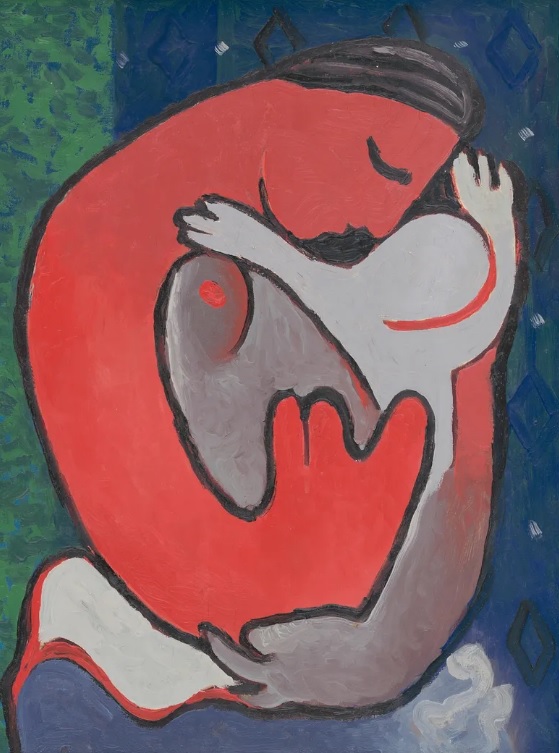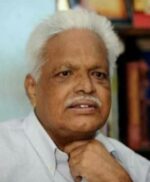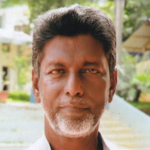Translated from the Malayalam by K.M. Ajir Kutty

Image used for representation.
Dr Balagopalan stood looking listlessly out that evening. Girls in small groups were walking past; cracking jokes and innocently bursting into laughter. They must be inmates of some college hostel. If only they could live laughing mirthfully like that forever! He wished them felicity in his mind.
Girls could burst into laughter like this only as long as they remained untouched by men. So long as the emotion of love lingers as a dream or rather as an elusive fragrance in the distance or so long as she experiences herself as an amazing phenomenon before she outgrows the prime of her age.
Shattering Balagopalan’s train of thoughts, that young man came to him again. He claims that he is a relative of a younger brother of the wife of an uncle of Balagopalan:
“Vasanthi has been moved to the labour room.”
The pangs of labour were visible on his face.
“Nothing more than that?” Balagopalan chuckled. “It will still take much time. There’s nothing to worry about.”
But that young husband did not feel relieved. He stood there, wriggling.
Balagopalan struggled hard to contain the irritation he felt. It is Vasanthi’s first delivery. From the fourth month onwards, she is being brought here to be examined by the specialist. She doesn’t have any problem that warrants extra care or special attention. They have come here to stay in a pay ward room booked when she had completed nine months of pregnancy. Two specialists have also been booked to attend to her. However, he is fretting as if he had faith in none.
This hospital is an odd one where they have seventy to eighty deliveries on average every day. And Vasanthi and her husband have been witnesses to the childbirths which have been happening mechanically as they were for the last month.
“Dr Revathi had come and examined her,” he murmured.
“What did she say?” Balagopalan asked by way of courtesy.
“She said she would come when it was time.”
“Umm.”
“It would not be out of place if the doctor went and examined her.”
Berating the misfortune that foisted on his night duty that day at the Casualty wing and mentally cursing his kith and kin as a whole, Balagopalan said:
“I will ask about her on the phone.”
Then he called the sister on duty on the intercom and enquired after her. The sister informed him:
“She has just started to have labour pains.”
As he was about to console that young man after putting back the intercom, he said as if he was weeping:
“Vasanthi is the kind of girl who would not bear even slight pain.”
“You could have remembered that beforehand,” though Balagopalan’s tongue pricked like spitting out those words, he didn’t.
Just then, bringing him some interim relief, a patient suffering from asthma came. As Balagopalan turned around after administering an injection to the woman who was writhing for want of an emergency remedy, he saw Vasanthi’s father waiting for him.
“My daughter has been moved into the labour room,” the old man too was panicked.
“I was told.”
“I have just seen Dr Alice. She has left saying that she would come when it was time. Will it turn out that there will be no one around when it’s time?”
“Isn’t it the doctor’s turn on duty? She will come.”
“But still… doctor, will you go and tell those nurses that Vasanthi is your own girl?”
“They know.”
The old man was not satisfied with that answer. In order to avoid his pestering presence, Balagopalan said:
“Alright, I am going there right away.”
Balagopalan knew that the old man would not budge unless he moved towards the labour room. Therefore, he started walking.
Following him, the father enquired:
“Would blood or something be required?”
Without knowing what to say to those who are prone to reading unwritten pages, Balagopalan clenched his teeth. But, the old man continued:
“All the same, I have arranged for that also. I have brought three or four people from my place for that.”
“Good,” complimenting him thus, Balagopalan moved ahead.
Vasanthi was standing on the veranda of the labour room. There were four or five women including her mother around her. Exchanging a word with them, Balagopalan turned back.
Saying some comforting words to the husband and the father who were walking among the plants in the courtyard, Balagopalan returned to the Casualty.
Just then, he saw a group of people coming in through the gate. It was a woman who was walking in the front. She had an old cloth bundle in her hand. She was flanked by two police constables, and just behind her was a woman police officer. The crowd of people was following them in a celebratory mood.
The forefront of the procession entered the hospital Casualty. Those who followed them tarried by the side of the veranda. The head constable stepped two feet up, saluted and said: “The damned girl has killed the baby she gave birth to by throwing it into the river. The incident took place at dusk. The local people caught her red-handed. A case has been charged against her.”
That killer woman placed the bundle in her hand on the floor and stood up straight. Not even a trace of panic was to be seen in her eyes!
Balagopalan remembered that the Health Department had just two things to decide here.
One: Confirm if the woman has signs of a recent delivery.
Two: Fix whether the baby was killed or died naturally.
Just then Balagopalan felt that it would be ideal for him to break free somehow from the kettle of fish he was in. He is not a specialist. And there isn’t any dearth of gynaecologists in this hospital. Further, if a case like this is attended, one might even have to go to court as well. Moreover, according to the rules, it is the Resident Medical Officer’s duty to attend cases like this. She is after all a well-known gynaecologist.
Balagopalan said to the Head Constable: “The R.M.O is upstairs. Go and tell her.”
As soon as the R.M.O. arrived, she asked Balagopalan: “Doctor, you could have done it yourself, couldn’t you?”
“I’m not a specialist, am I?”
“Is a specialist required to look for the signs of recent delivery?”
“I don’t want to do it, madam.”
The killer woman who stood listening to their exchange said:
“Doctor, you shouldn’t get nasty. I don’t need to be examined. It was I who delivered this. No need to doubt.”
“When did you deliver?” the R.M.O. asked.
“At dusk-fall yesterday.”
“Where?”
“Lying in the sugarcane plantation on the bank of the river there. By God’s grace, I did not have any difficulty. I was all alone.”
“Could you have not come here?”
“Going to the hospital for delivery is not our lot.”
“Why not?”
“Doctor Mother! Do you want me to spit it out? I had come here to deliver the elder child. I had to use up what I had earned by sacrificing my honour apart from what I had borrowed from others. When I was discharged, what I had was the newborn baby and that which I had worn. But still, were there any deficiencies in the words and gestures of rebuff directed at me? I can tell you about the persons and their names if you want.”
The lady doctor felt that it would be better if she digressed.
“Well, where is your elder child?”
“Not one, I have two. They may be at the bus stand or at the railway station. I too haven’t seen them for four days. They are boys. They will grow up on their own.”
“Did you actually kill this baby?”
“Doctor, I will tell you the truth. I delivered it yesterday evening. This is a boy, too. When the day had advanced toward 10 o’clock since the day broke today, he stopped breathing. What shall I do? My father hadn’t owned anything so as to leave me a piece of land as an inheritance where I could have buried him in a small pit. I have been walking with this corpse since then. I walked all over the city looking in every nook and corner for a tiny spot where I could just shove him in. At the end of the desperate search, all that I was left with were my tired and aching legs and my hands grown exhausted carrying the corpse. If I were to throw it away in a bundle somewhere, dogs would get at it tearing it apart. Would the abdomen that delivered it bear with it? That was why when it grew dark, I dropped him in the river!”
“Lying slut! What she says is but lie,” the people who were listening intently shouted in one voice.
“Hi, truth-telling Harischandras, all! Will any one of them give one and a half feet of land? Come doctor, you ask them. Perhaps the man who fathered it would also be in the crowd!”
Nobody did utter anything. After a while, she continued. “If I had wanted to kill and dump it in water, I could have waited and done so till the night grew thicker. Or else, I could have taken and left it on the rail tracks, couldn’t I? The one who always remains awake up in the sky with wide-open eyes is a witness to it all. If he had given it life, I would have brought it up also till it could stand on its own.”
It seemed as though she was on the brink of sobbing.
Balagopalan saw Vasanthi’s husband’s head at a distance. As he came running to say something, upon seeing the crowd unexpectedly, he stopped at a distance, panting. Balagopalan enjoyed watching that scene. In his mind, he was all praise for the killer woman. The R.M.O. directed: “Note down the case in the register, anyway.”
“Tell them your name, gal,” the authority invested with the policeman raised its tongue.
“Will the old name do? Or shall I tell them a new one?” The killer woman asked.
“Are you getting smart with me? Speak properly, gal,” he clenched his teeth.
“Oh, now he has come to teach me courtesy! It is the courtesy taught by a head constable some time ago that is begging as a boy at the railway station… sir, you may write down my name as Devaki or Chandramathi or something like that. Or Chandramathi will do, just that.”
“Tell us the place you live in, gal,” the policeman again pressed her.
“You may note it down as Manakkad or as Veli or Poojappura, sir. For us, it’s all the same.”
“Don’t be so bull-headed, gal. Tell us the place you live in.”
“Then Thiruvananthapuram will do.”
“One of a drove of imbeciles,” the woman constable growled.
“Right. If otherwise, would my lot be like this?” the killer woman turned to her. “Is it our reluctance to divulge our real names and places thereby bringing ignominy to the women who delivered us and the men who fathered us, that is stupidity on our part?”
Nobody responded to that question.
“Now she will be examined only after daybreak tomorrow. Let her sleep here today,” the R.M.O. said.
Soon the crowd started protesting. The R.M.O. turned toward them. “It’s immaterial whether the infant died or was killed by her. Why do you annoy people by hauling in all these obstacles?”
“We simply cannot ignore these things,” a youth reasoned.
“Now suppose the court punished her, will that save the country and put it on the path of becoming a Ramarajya?”
“That’s not the issue, doctor. We want to bathe in the river. Throwing the bodies of killed infants in the river has become common these days. When you surface after taking a dip in the water, it’s some corpse that is hitting your head and face. This must come to an end,” a grown-up man among the crowd said.
“Right, right,” the R.M.O. left the place quickly, denying them space for any prolonged talk.
The woman police constable was caught in a trap. Now she cannot go home. She must stand guard against the killer woman. Both the constables, a man and a woman, cursed the morally driven public.
Thus the job of giving her a safe night’s shelter fell on the head of Balagopalan. She can be given a cot. But what should be done with the child? Government rules forbid one from laying a corpse on the cot. If the thing is kept somewhere away from her, stray dogs making their rounds within the hospital compound might snatch it away. If the exhibit is lost, the judicial system will be infuriated.
Those who were on duty in the Casualty wing put their heads together and found a way out. Both the mother and the child were to be laid on the floor on a bed sheet. They picked out three torn bed sheets from the pile of laundered ones and threw them to her.
Then they led the killer woman to the veranda by the side of the observation room. The woman police constable was provided with a cot too. To prevent the accused woman from running away, the grilled door of the veranda was secured with a lock and the key was deposited safely back in Balagopalan’s pocket itself.
The crowd, still in the grip of anxiety, refused to disperse. They were determined and sat around the tree in the courtyard.
Balagopalan went to attend to a patient who was brought in just then. When he was examining the pulse of that heart patient, the father of Vasanthi came rushing toward him and informed: “Doctor, Revathi has come. But Dr Alice was not to be seen.”
“She will come.” Balagopan’s voice showed obvious signs of annoyance. The old man rushed back without saying anything more.
After about half an hour, stepping into the veranda, Balagopalan took a glance beyond the grille. The woman police constable had fallen asleep. The killer woman was sitting on the bed sheet spread on the floor with her legs stretched out. She was wrapping up the corpse of the infant in another sheet.
It was slightly cold outside. It perhaps was to protect the baby from being frostbitten. Balagopalan thought, in a lighter vein.
He returned to his duty room.
One or two more patients arrived. In the meantime, he also did not forget to enquire about the condition of Vasanthi.
When he had finished attending the cases, he couldn’t stop himself from dozing off sitting on the chair leaning against its back.
The duty night sister woke him up and said: “Someone is calling you, doctor. Someone who had come earlier too looking for you.”
Balgopalan walked into the veranda. It was the husband of Vasanthi. His face was lit with the relief of Vasanthi having delivered a baby, not to mention a pale smile looming on his lips.
“Vasanthi has delivered. A girl.”
Balagopalan smiled as though he was congratulating that man who had just become the father of a newborn child.
“So everything ended on a happy note, didn’t it?”
“Yes.”
The youth stuck around there as if he had to say something more.
“Anything more to say…?” Balagopalan asked so as to lighten his worries.
“Who is so famous for treating child diseases in this city? I mean paediatrician.”
Balagopalan suppressed his laughter in the throat itself with some effort. “The child doesn’t have any problem now, does it?”
“No. But still…” He looked at Balagopalan lovingly.
Balagopalan told him the name of a well-known paediatrician. Vasanthi’s husband was quite relieved to hear that. He bowed before him and withdrew.
Before re-entering the duty room, he thought he would take a look at the condition of the guest they had that day. He drew near the grille of the door. The killer woman was fast asleep lying on her back, snoring deeply.
He particularly noted that she had her head slightly raised. He suddenly remembered that she had not been given any pillow.
He observed again, keenly. The exhibit was missing. He had a shudder within. He stood on his toes and looked again.
The moment it became clear to him that it was that exhibit itself that she had kept beneath her head comfortably packed in a bundle, he clawed at the grille of the door.
Also, read the second episode of a Bengali science fiction, Dita’s Watch, written by Dipen Bhattacharya, translated into English by Chirayata Chakraborty, and published in The Antonym:
Follow The Antonym’s Facebook page and Instagram account for more content and exciting updates.



























0 Comments